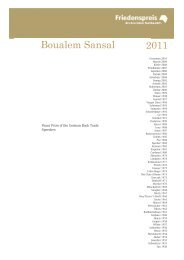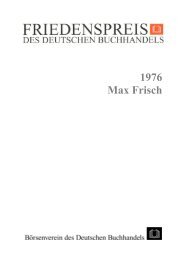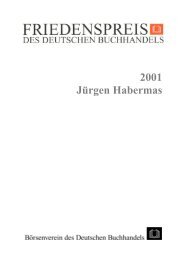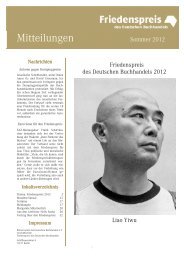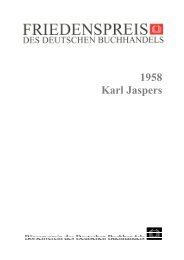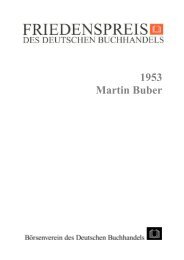2003 Susan Sontag - Friedenspreis des Deutschen Buchhandels
2003 Susan Sontag - Friedenspreis des Deutschen Buchhandels
2003 Susan Sontag - Friedenspreis des Deutschen Buchhandels
Erfolgreiche ePaper selbst erstellen
Machen Sie aus Ihren PDF Publikationen ein blätterbares Flipbook mit unserer einzigartigen Google optimierten e-Paper Software.
FRIEDENSPREIS DES DEUTSCHEN BUCHHANDELS<br />
us that he had fought with Pershing's army in<br />
Mexico against Pancho Villa: this grizzled veteran<br />
of an earlier American imperialist venture<br />
had, it seems, been touched - in translation - by<br />
the idealism of German literature, and, having<br />
taken in my particular hunger for books, loaned<br />
me his own copies of »Werther« and »lmmensee«.<br />
Soon after, in my childhood orgy of reading,<br />
chance led me to other German books, including<br />
Kafka's »ln the Penal Colony,« where I discovered<br />
dread and injustice. And a few years later,<br />
when I was a high school student in Los Angeles,<br />
I found all of Europe in a German novel. No<br />
book has been more important in my life than<br />
»The Magic Mountain" - whose subject is, precisely,<br />
the clash of ideals at the heart of European<br />
civilization. And so on, through a long life<br />
that has been steeped in German high culture.<br />
Indeed, after the books and the music, which<br />
were, given the cultural <strong>des</strong>ert in which I lived,<br />
virtually clan<strong>des</strong>tine experiences, came a real<br />
experience. For I am also a late beneficiary of<br />
the German cultural diaspora, having had the<br />
great good fortune of knowing well some of the<br />
incomparably brilliant Hitler refugees, those<br />
writers and artists and musicians and scholars<br />
that America received, starting in the 1930s, and<br />
who so enriched the country, particularly its<br />
universities. Let me name two I was privileged<br />
to count as friends when I was in my late teens<br />
and early twenties, Hans Gerth and Herbert<br />
Marcuse; those with whom I studied at the University<br />
of Chicago and at Harvard, Christian<br />
Mackauer and Paul Tillich and Peter Heinrich<br />
von Blanckenhagen, and in private seminars,<br />
Aron Gurwitsch and Nahum Glatzer; and Hannah<br />
Arendt, whom I knew after I moved to New<br />
York in my mid-twenties - so many models of<br />
the serious, whose memory I would like to evoke<br />
here.<br />
But I shall never forget that my engagement<br />
with German culture, with German seriousness,<br />
all started with obscure, eccentric Mr. Starkie (I<br />
don't think I ever knew his first name), who was<br />
my teacher when I was ten, and whom I never<br />
saw afterward.<br />
And that brings me to a story, with which I<br />
will conclude - as seems fitting, since I am neither<br />
primarily a cultural ambassador nor a fervent<br />
critic of my own government (a task I perform<br />
as a good American citizen). I am a storyteller.<br />
So, back to ten-year-old me, who found<br />
some relief from the tiresome duties of being a<br />
child by poring over Mr. Starkie's tattered volumes<br />
of Goethe and Storm. At the time I am<br />
speaking of, 1943, I was aware that there was a<br />
prison camp with thousands of German soldiers,<br />
Nazi soldiers as of course I thought of them, in<br />
the northern part of the state, and, knowing I was<br />
Jewish (only nominally, my family having been<br />
completely secular and assimilated for two generations,<br />
but nominally, as I knew, was enough<br />
for Nazis), I was beset by a recurrent nightmare<br />
in which Nazi soldiers had escaped from the<br />
prison and had made their way downstate to the<br />
bungalow on the outskirts of the town where I<br />
lived with my mother and sister, and were about<br />
to kill me.<br />
Flash forward to many years later, the<br />
1970s, when my books started to be published<br />
by Hanser Verlag, and I came to know the distinguished<br />
Fritz Arnold (he had joined the firm<br />
in 1965), who was my editor at Hanser until his<br />
death in February 1999.<br />
One of the first times we were together,<br />
Fritz said he wanted to tell me - presuming, I<br />
suppose, that this was a prerequisite to any<br />
friendship that might arise between us - what he<br />
had done during the war. I assured him that he<br />
did not owe me any such explanation; but, of<br />
course, I was touched by his bringing up the<br />
subject. I should add that Fritz Arnold was not<br />
the only German of his generation (he was born<br />
in 1916) who, soon after we met, insisted on<br />
telling me what he or she had done during the<br />
Nazi era. And not all of the stories were as innocent<br />
as what I was to hear from Fritz.<br />
Anyway, what Fritz told me was that he had<br />
been a university student of literature and art<br />
history, first in Munich, then in Cologne, when,<br />
at the start of the war, he was drafted into the<br />
Wehrmacht with the rank of corporal. His family<br />
was, of course, anything but pro-Nazi - his father<br />
was Karl Arnold, the legendary political cartoonist<br />
of »Simplicissimus« - but emigration<br />
seemed out of the question, and he accepted,<br />
with dread, the call to military service, hoping<br />
neither to kill anyone nor to be killed.<br />
Fritz was one of the lucky ones. Lucky, to<br />
have been stationed first in Rome (where he<br />
refused his superior officer's invitation to be<br />
commissioned a lieutenant), then in Tunis; lucky<br />
enough to have remained behind the lines and<br />
never once to have fired a weapon; and finally,<br />
12



